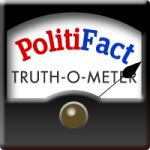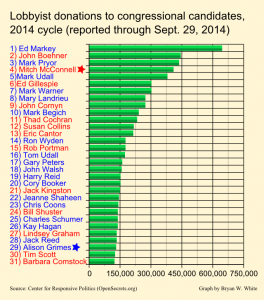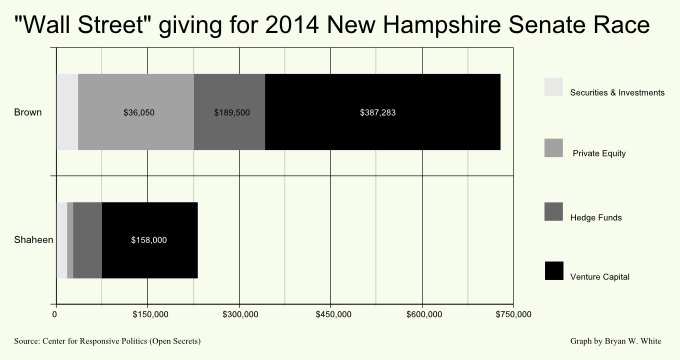 Occasionally the mainstream fact checker PolitiFact will publish an article giving an overview of a fact check topic. But two recent fact checks of political attack ads point to the need for one PolitiFact has yet to publish: the relevance of the source of political campaign cash.
Occasionally the mainstream fact checker PolitiFact will publish an article giving an overview of a fact check topic. But two recent fact checks of political attack ads point to the need for one PolitiFact has yet to publish: the relevance of the source of political campaign cash.
On March 27, 2014, PolitiFact published a fact check of an ad by Alison Lundergan Grimes (D-Ky.) attacking incumbent Senate Minority Leader Mitch McConnell (R-Ky.). The ad said McConnell was the No. 1 recipient of lobbyist giving for the 2014 campaign cycle. Using statistics from OpenSecrets.org, PolitiFact ruled the claim “True.”
On Sept. 19, 2014, PolitiFact published a fact check of an ad by Senator Jeanne Shaheen (D-N.H.) attacking the Republican challenger for her seat, Scott Brown. The ad said Brown received more campaign cash from “Wall Street” than any other candidate. PolitiFact rated the ad “Mostly True.”
Neither fact check from PolitiFact made a noticeable attempt to put the political giving in context.
 Grimes, McConnell, and lobbyists
Grimes, McConnell, and lobbyists
If it’s bad to receive money from lobbyists, then McConnell is bad. But if both McConnell and Grimes receive money from lobbyists it’s not so easy to prefer one candidate over another based on money received from lobbyists. We’d have two pairs of dirty hands instead of just McConnell’s.
PolitiFact reported on the amount Open Secrets credited to McConnell when Grimes made her claim, $281,301. Much later in the fact check, just before the summary, PolitiFact mentions Grimes had received $54,699.
PolitiFact noted in a Sept. 24, 2014 article that McConnell’s ranking had dropped to No. 4, but omitted any information on the amount Grimes received from lobbyists. Grimes now ranks No. 29 among congressional candidates. The new No. 1? Ed Markey, a Democrat from Massachusetts. Markey leads his Republican challenger by over 20 percentage points in the polls. PolitiFact calls Markey’s case a “quirky anomaly” since he has run twice during the 2014 cycle. But just half of Markey’s $646,000 would put him at No. 5 on the list.
Sen. Markey’s huge lead in lobbyist donations—his $645,971 tops second place by over $200,000—helps show the absurdity of Grimes’ attack ad. Does Markey need all that money to fend off Republican challenger Brian Herr? Not really. Massachusetts leans well left. Will Grimes denounce Markey and throw her support behind his challenger? Of course not. Her attack ad makes a convenient way to attack McConnell on the basis of his incumbency. That’s it. Grimes would happily accept more money from lobbyists if she could get it. She’d love to be No. 1.
Shaheen, Brown, and “Wall Street”
Sen. Shaheen only received a “Mostly True” rating from PolitiFact. PolitiFact said all she did wrong was expand the definition of “Wall Street.” PolitiFact found this approach made the true number “about one-fifth lower than what the ad said.” Using the standard mathematical formula, we call Shaheen’s claim an exaggeration of 26 percent.
Shaheen, of course, looked only at what was donated to Brown during the 2012 cycle in a close-fought and high-profile contest with the eventual winner in Massachusetts, Senator Elizabeth Warren. How do things stack up between Brown and Shaheen in 2014? For our comparison, we’ll use the categories PolitiFact chose as a better fit for “Wall Street” giving than the one Shaheen used.
Clearly Brown has raised more money from “Wall Street” than Shaheen has. But Brown hasn’t brought in the “millions” this cycle Shaheen warns about. And, as with Grimes up above, if “Wall Street” money unduly influences politicians then why has Shaheen accepted over $200,000 from “Wall Street”?
The lying underlying argument
In the fact checks of Grimes and Shaheen, PolitiFact focuses on a statistic and ignores the way the ads use the information to craft fallacious arguments. Though PolitiFact sometimes evaluates an underlying argument, the two Democrats in our examples escaped that type of scrutiny. Both ads rely on the Texas Sharpshooter fallacy. The ads place an importance on a statistic that either doesn’t exist or exists to a far lesser degree than the ads suggest.
In Grimes’ case, the ad cherry picks one time frame to support a misleading generalization about her opponent. As the data show, the leader in lobbyist giving one day can fall back to No. 4 in a matter of weeks. And Grimes herself has drawn a considerable amount of cash from lobbyists, rising from No. 51 to No. 29 in the rankings since she launched her attack on McConnell. The campaign cash McConnell receives from lobbyists creates a weak inference at best that McConnell is a Washington insider.
In parallel to the Grimes ad, the Shaheen ad cherry picks money her opponent raised from “Wall Street” in 2012 and ignores the way changes in the patterns of Wall Street giving affect Shaheen’s underlying argument. Is Brown a puppet of “Wall Street” thanks to the money he received? He’s a little over three times the puppet Shaheen will be, according to the data in our chart for the current cycle. But neither will challenge Ed Markey in that department.
The campaigns designed these ads to get the audience to accept a false or weak inference about campaign giving as a solid inference. PolitiFact approved the ads.
The fact-checking angle
Fact checkers striving for objectivity should adopt a consistent approach to political claims offering a factoid offered in support of an inference. Fact checkers may look at the factoid, the inference or the two combined. Fact checkers seeking objectivity should look for both every time. Any rating of the claim should follow a consistent system in weighting the two aspects of the claim.
If fact checkers do not adopt this approach, their systems create an avenue for ideological bias to creep into the ratings.
Pre-Publication Update
After we completed most of the work on this article, we found a great example of PolitiFact ignoring the factoid to focus instead on the underlying argument.
PolitiFact Florida, on an ad from the Republican Party of Florida offering anecdotes about the effects of the Affordable Care Act:
The ad doesn’t identify the various men and women complaining about Obamacare making it impossible to verify each individual’s experiences. State GOP spokesperson Susan Hepworth’s only reply to our questions about the people and their insurance woes: “They are not actors.”
But we can research the ad’s overall message that the Affordable Care Act has inflated Floridians’ health care costs anywhere from 30 percent to twice as expensive.
This is not a consistent approach.




